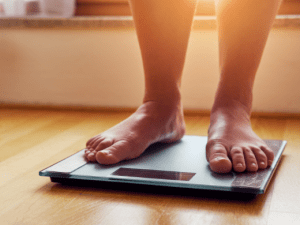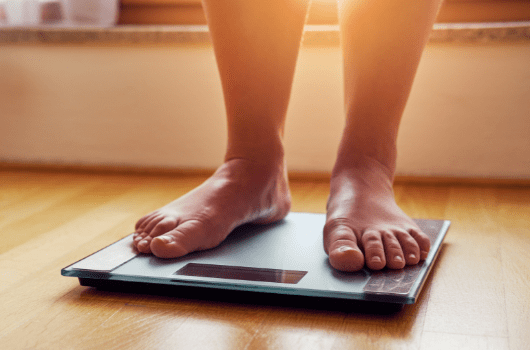Ever wondered why the number on the scale changes day to day? Ever wondered why one week you can lose 7lbs, but then next you lose nothing? Even when we think we’re doing everything by the book and sticking to our exante diet plan, the number on the scale might not always match our expectations.
We see a lot of discussions surrounding weigh fluctuations in our closed Facebook group and to shed some light on this, we asked Dr Frankie Jackson-Spense to share some knowledge.
And if this is something that affects you, read on for our top tips on how to prevent and manage weight fluctuations…

Here’s what Dr Frankie has to say:
“We all know that feeling of stepping on the scales after a period of seemingly being ‘healthy’ and feeling disheartened by the number. But weight fluctuations are NORMAL and not something you should give so much power to. The number on the scale going up over night does not necessarily mean you’ve gained weight and all your hard work in the gym or with your nutrition has gone to waste.
There are many possible reasons for your weight fluctuating day to day and studies have shown our weight can fluctuate as much as 4 pounds a day!
The main reason is due to water loss or retention. When you suddenly change your diet – particularly if eating less carbs you might notice a quick loss of a few pounds. Some of this will be water weight. When carbs are eaten, they are stored in our muscles as glycogen and this process stores it with water. Therefore if you eat a carb-rich meal you might be heavier than if you ate the same number of calories in protein or fats –but there’s no need to worry – it’s not real fat gain!
Similarly, if you increase your consumption of salt, usually if you’ve eaten in a restaurant or eaten pre-prepared foods, the excess salt will cause more water to be retained in your body. There are lots of other reasons for weight fluctuations such as whether you’ve sweat a lot, whether you’ve had an intense workout, hormones (particularly during the menstrual cycle), starting new medications or depending on how regular your bowel motions are.”
Exante’s top tips
- Don’t weigh everyday – The number on the scales change day by day, like Frankie’s mentioned, things like water retention, exercise, hormones, etc can all impact this. Weigh weekly, or even fortnightly for more accurate readings.
- Weigh in the morning, before you’ve eaten and after you’ve been to the loo – We all tend to be lightest in the mornings and food and waste all add to the number on the scales. It makes sense to weigh before you properly start the day!
- Focus on none-scale changes – Instead, focus on other physical and mental changes – do you feel more energetic? Has your mood changed? Do your clothes feel looser? [1] Check out this blog post on celebrating ‘non-scale victories’ below!

Non-Scale Victories | A Different Way to Measure Your Diet Success
Non-Scale Victories (NSVs) are a great way of celebrating your diet achievements without focusing on numbers changing on the scales. Click here to read about some of our Exante Customer's NSVs.
- Be patient – Remember, losing and managing weight is a journey. They’ll be ups and downs, sometimes it’ll seem impossible, sometimes it’ll feel easy. The key message here is, although you may not always see the results you expected, being patient and sticking to your plan will go a long way. You’re more likely to reach your goals is you persevere, commit and practice patience. As the old saying goes…”It’s a marathon, not a sprint!”
- Manage your stress – When we’re stressed, we tend to use food as a coping mechanism and unfortunately that tends to be the typical “comfort foods” like high calorie and ultra-processed foods. These foods also tend to be high in salt and sugar, which tend to increase the amount of water we retain. To see more of Dr Frankie’s tips on combatting stress, check out the article below:
- Manage your sleep – According to the NHS, a lack of sleep affects your health in a number of ways. Not only can it affect your mood and ability to focus, it can also increase our risk of developing a number of diseases. In terms of weight fluctuations, a lack of sleep decreases our levels of leptin, the “satiety hormone”, and increases our levels ghrelin, the “hungry hormone” – both these together means we’re much more likely to overeat when we’re tired or haven’t had enough sleep. [2] And if you’re really struggling with you’re sleep…we’ve got advice for that too! Check out the ultimate guide to sleeping well below.
It’s completely normal for the number on the scales to change day by day, hour by hour. Remember, fat loss does not always correlate with the number on the scale and our body weight can be impacted by a number of things.
The important thing to remember is not to let it get to you! Enjoy your journey, and allow your body to do it’s thing. There’s no need to be hellbent on what the scales say, the most important thing if how you feel! So if you are a daily-weigh-in culprit, cut them out…your mind and body will thank you for it!
Want to join our community? Join our closed Facebook group where you can get involved in a number of topics and conversations similar to this one.
Be sure to follow our Instagram where we post helpful weight loss tips, motivation and product recipe hacks. We’d love to hear your non scale victories and transformations too, tag us @exantediet to share your story.

